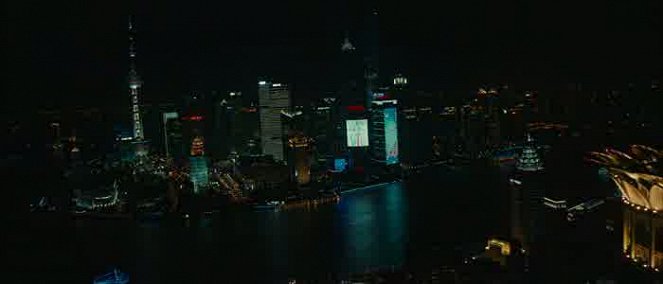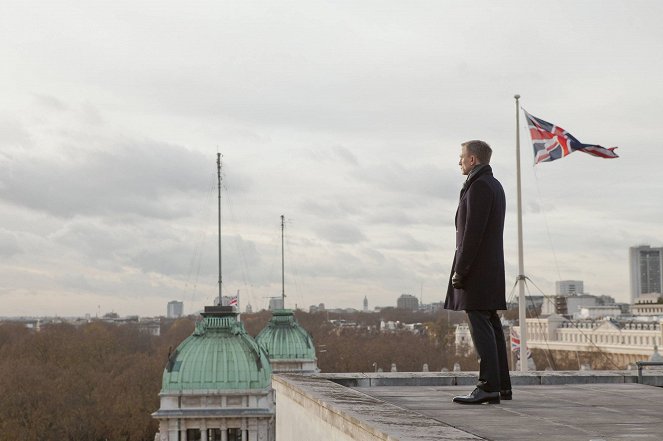Directed by:
Sam MendesCinematography:
Roger DeakinsComposer:
Thomas NewmanCast:
Daniel Craig, Judi Dench, Ralph Fiennes, Javier Bardem, Naomie Harris, Bérénice Marlohe, Ben Whishaw, Helen McCrory, Albert Finney, Rory Kinnear, Ola Rapace (more)VOD (4)
Plots(1)
Bond's loyalty to M (Judi Dench) is tested as her past returns to haunt her. 007 must track down and destroy the threat, no matter how personal the cost. When Bond's latest assignment goes gravely wrong and agents around the world are exposed, MI6 is attacked forcing M to relocate the agency. These events cause her authority and position to be challenged by Mallory (Ralph Fiennes), the new Chairman of the Intelligence and Security Committee. With MI6 now compromised from both inside and out, M is left with one ally she can trust: Bond. 007 takes to the shadows — aided only by field agent Eve (Naomie Harris) — following a trail to the mysterious Silva (Javier Bardem), whose lethal and hidden motives have yet to reveal themselves. (20th Century Fox UK)
(more)Videos (39)
Reviews (20)
The first half of Skyfall, the only highlight of which is the Shanghai skyscraper, is well crafted but lengthy. Following the obligatory Bond traditions, the pace of the story is slowed down by unnecessary characters (the Bond girl) and brings few surprises (Bond being equipped with technological toys). However, from the scene with a sailboat approaching the island – and the villain’s entrance – it is the best Bond movie until today. Paradoxically, it doesn’t really look like a Bond movie at all. Too bad that the directors of subsequent instalments won’t be able to follow in Mendes’s footsteps. The editing art in the scene involving the imminent court attack and the visual aesthetics in Scotland elevate the Bond brand to the level of a delicate film drama. It is also the first Bond movie in which I enjoyed the relationships between the characters. Javier Bardem, whose performance is somewhere between the Joker and Hannibal, should get an Oscar nomination for Best Supporting Actor.
()
As an uncritical admirer of QoS, I am quite amazed at how many people there are who are able to bitch about Bond ceasing to be Bond and fading out of the franchise. Yet Sam Mendes has made the most classic entry in the saga, one that fits perfectly into the Sean Connery era in particular, while still being able to work within the confines of the new century. In the opening action, the excavator seems to symbolically break the trend of the previous two films, so that the protagonist then sets out on a new adventure through the path of presumed death. It serves up all the old-school proprieties, starting with a creepy villain that Bardem relishes to no end (the dental exposition will keep me waking from sleep for a long time) while still managing to make fun of them (the conversation with Q) and still managing to get deeper into Bond's head than last time. Everything then culminates in a purely personal final battle, which styles itself as a personal apocalypse (not only because of the helicopter raid). If anything deserves extreme praise, it's Deakins' cinematography and the lighting work (the Shanghai episode rules!), which is crowned by Newman's music, taking a novel route in the style of John Powell. Craig, as usual, is on point. If I have anything to criticize the film for, it is perhaps the persistent effort to remind us that it is "old-school." However, a second screening will certainly fix that. [And it did. A film perfect in every detail. Watching it is pure ecstasy.]
()
This review is licensed to SPOIL. “Were you expecting an exploding pen?” Whereas Bond learned to use his memory in Quantum of Solace, now he uses his memories to delve much deeper into his own inner self (which the filmmakers subsequently use to delve deeper into MI6). His journey back to himself typically begins with a descent into the depths (the title sequence from the great beyond) and the subsequent retreat into the darkness (the action scenes contain frequently suspicious falling). Most of the film takes place underground and/or at night, like in one of the good old noir flicks that Mendes quotes from a few times (The Lady from Shanghai, The Third Man). The whole opening action sequence recalls earlier times, serving together with the following minutes as a final farewell to the straightforwardly action-oriented approach that was a guarantee of guilty-pleasure entertainment. That is surely no coincidence, because thanks to its atypical length, excellent gradation and the number of vehicle replacements, the prologue could easily serve as the film’s final attraction. The circular dramaturgy, with the beginning functioning as the end and the end functioning as the beginning, comes to fruition in the final act, which is surprising due to its static nature compared to the extremely dynamic start. ___ The defensive character of the final action sequence has its justification in the next task that Bond is confronted with – he must literally defend his old-fashioned methods against geeks, bureaucrats and the white-haired devil, who wickedly attacks one of the guarantees of the agent’s immortality, namely his manhood, which is thematised throughout the film. The astonishingly subversive (to the heterosexual majority) torture scene lasts an unusually long time compared to previous such scenes, and the homosexual innuendos in it are delivered comprehensibly enough to elicit defensive laughter from cinema-goers. As is customary for ambitious blockbusters, Silva has questionable motivations and it is very difficult to capture the evil of his jellyfish-like character (jellyfish-like shapes can be seen not only in the title sequence, but also during the shadow-play action set in Shanghai) and, at the same time, he is a complete antithesis to the positive protagonist (though he dresses in white, while Bond wears a black suit). He shares a notional mother with the orphaned Bond, and whereas Silva is in the role of the rejected son, James is the prodigal son. Though the name (M) remains the same, the mother is replaced by the father, from whom the fatherland is derived, which explains the greater emphasis on the “Englishness” of the film (the row of coffins draped with British flags, Turner’s painting, the Tennyson quote, the proud shots of London) and in which Bond finds the meaning of his other activities – in service to his country. The archetypal conflict between Cain and Abel is thus added to the motif of the Odyssean journey. The more daring among us could interpret the film as a family melodrama – it is probably the first Bond movie in which we see 007 not only with a bottle of beer, but also with a tear in his eye. As in the previous films, the women are melodramatically presented as victims, though they are no longer entirely passive. ___ Skyfall is rich in meaning not only in psychoanalytical terms (MI6 as the superego, Silva as the dark subconscious and Bond serving as the ego between them), as specialists in cultural studies can surely also find something for themselves in it (this time, the exotic landscapes are replaced by a symbol of modern China and the former colony). Mainly, however, Skyfall is an intelligent psychological-spy thriller. With captivating establishing shots to set the mood, clearly executed action scenes (a pleasant change after Marc Forster’s orgies of editing), non-black-and-white characters and a powerful soundtrack (though it’s a shame about the uneconomical use of John Barry’s musical motif), delightfully unobtrusive allusions to previous Bond films and some other celebrated works of cinema (Bond’s arrival in futuristic Hong Kong is reminiscent of the long car ride in Tarkovsky’s Solaris; the drive to Skyfall is filmed like the prologue to The Shining). The shots between action and reaction, when Bond is only just discovering new locations, best represent the filmmakers’ attempt to bring the agent closer to the real world. The opening shot is repeated multiple times; when we enter uncharted territory with Bond with the camera behind his back, a new world literally opens up before us (and Bond). It can be assumed that 007 will even more openly address the problems of today’s world in subsequent films, after he has dealt with his own private traumas. 90%
()
(less)
(more)
We all get older and nostalgically look back at the days when things were clearer and more straightforward. In Skyfall, the “humanisation” of Bond has veered in the direction of John McClane-style (along the lines of Live Free or Die Hard, to be precise) ridicule of today’s overly sophisticated and extravagant glorification of the good old straightforward ways. However, Bond is not the only one who is aging; we viewers are too, so we can join the hero in turning up our noses at the constant references to the Bond canon. Let’s acknowledge that the spectacular proof that the filmmakers spent hours reading the relevant wiki before writing the script is no longer a sign of superior dedication or self-reflection, but one of the main formulas for creating new contributions to old franchises. Besides that and the simplified oedipal storyline (if his adoptive mother had come out with the villain to raze his birthplace filled with the traumas of adolescence, there could have been peace), Skyfall also restores to the postmodern Bond movies the campiness of the earlier classics, which is manifested in the charismatic derangement of the villain, the ridiculousness of his nonsensically overwrought plans, the money-shot surrealism of the action sequences and, mainly, the climax, which evokes Scarecrow, Home Alone and Sightseers in equal measure. Thanks to that, we can grumble together with Bond about the over-cleverness of contemporary blockbusters, but regardless of that (or perhaps even because of it) we can simply enjoy the film as viewers.
()
A film about the importance of large sailboats in times of fast ships and a romantic dream of a return, thanks to which Bond survived half a century. A narcissistic reflection of what I have for years adored Bond films for. Sail on, heroic heart, made weak by time and fate, but strong in will to strive, to seek, to find and not to yield.
()



Ads